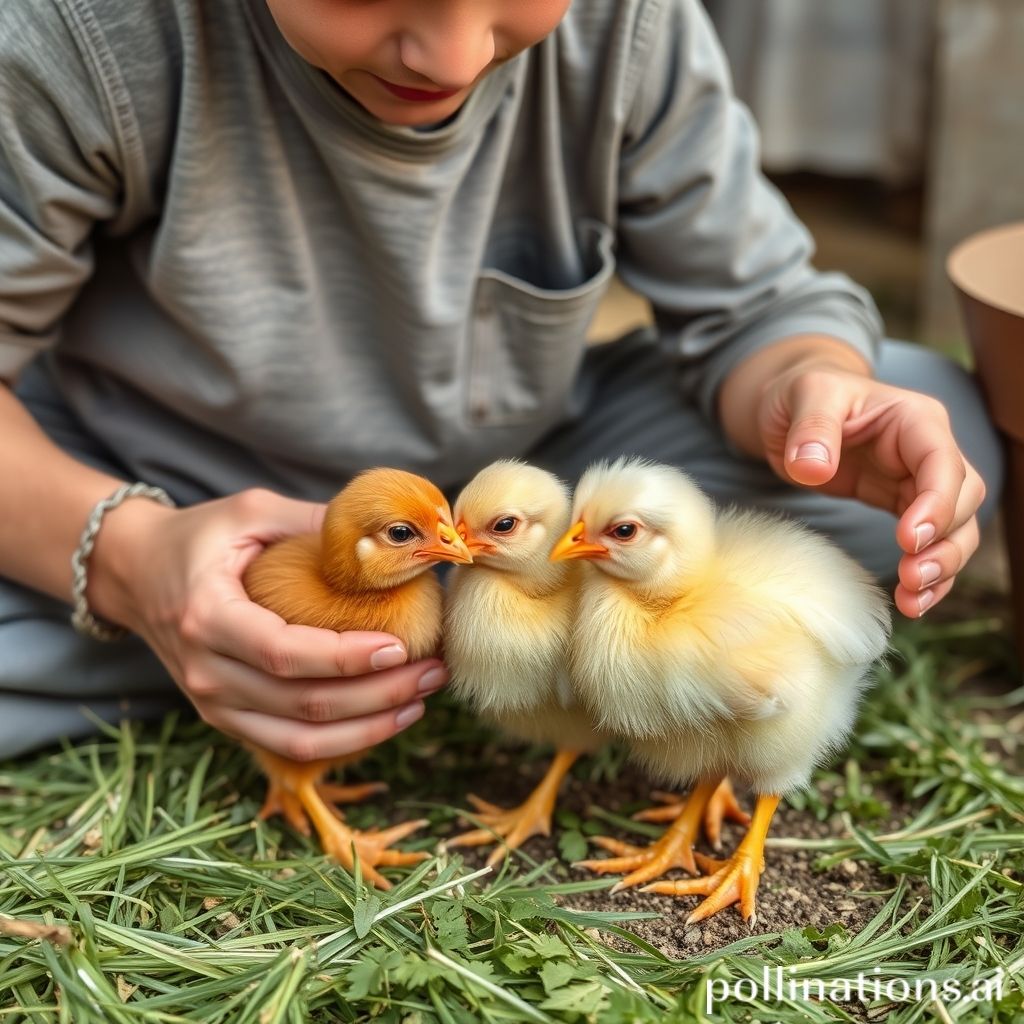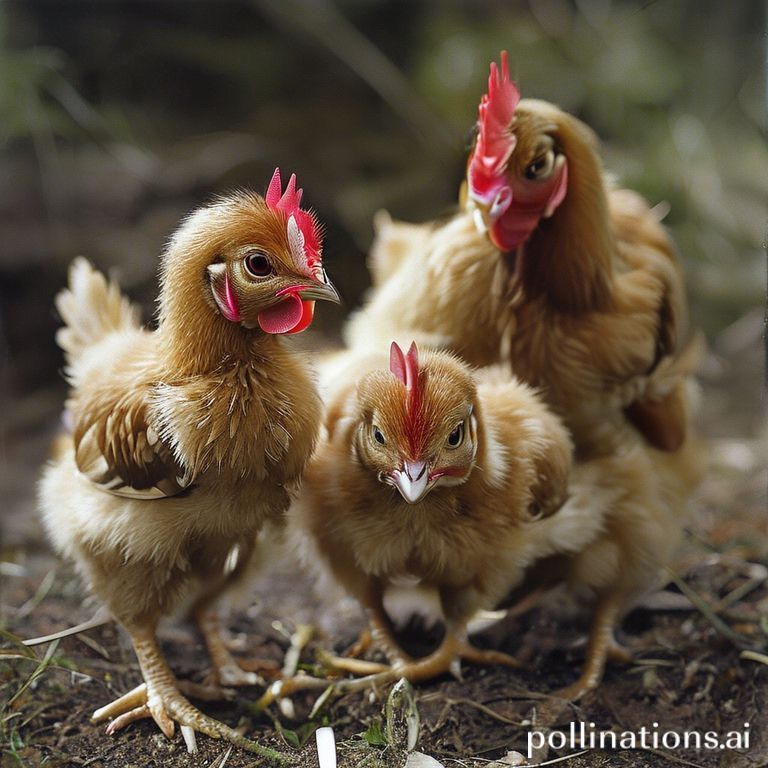Building a strong bond with your baby chickens is a rewarding experience that can lead to a lifetime of affection and trust. Whether you’re a new chicken owner or an experienced one, knowing how to get baby chickens to like you is crucial.
Developing a positive relationship with your feathered friends not only makes them happier, but it also makes your interactions more enjoyable. In this guide, we’ll explore proven techniques, behaviors, and actions that you can implement to encourage your baby chickens to develop a liking towards humans. Get ready to create a bond that will last a lifetime.
Creating a Cozy Environment for Young Chickens
When raising young chickens, it is crucial to provide them with a comfortable environment to promote their well-being and growth. Here are some important factors to consider:
1. Ensuring a Warm and Safe Brooder Setup
Creating a warm and secure brooder setup is vital to ensure the health and safety of your young chickens. Use a brooder box or a specialized brooder lamp to maintain a temperature of approximately 95 degrees Fahrenheit during the first week. Gradually decrease the temperature by 5 degrees each week until the chickens are fully feathered. This mimics how a mother hen keeps her chicks warm in nature.
Make sure the brooder is draft-free and well-ventilated to prevent respiratory issues. Line the bottom with clean bedding, such as pine shavings or straw, to provide a comfortable surface for the chicks to walk on and absorb any moisture.
2. Keeping the Living Space Clean and Hygienic
A clean and hygienic living space is essential for the health and well-being of your young chickens. Regularly clean and sanitize the brooder to prevent the accumulation of bacteria and parasites. Promptly remove any soiled bedding, droppings, or uneaten food. Provide fresh bedding and ensure proper ventilation to maintain a dry environment.
It is also important to consider the space requirements as your chicks grow. They will need more room to move around comfortably. Gradually transition them to a larger coop or outdoor area as they mature.
3. Providing Nutritious Food and Fresh Water
Proper nutrition is crucial for the growth and development of young chickens. Offer a balanced diet consisting of high-quality chick starter feed that contains essential nutrients, vitamins, and minerals. Additionally, make sure fresh water is always available and easily accessible for the chicks.
You can also consider supplementing their diet with treats like vegetables and fruits, but be cautious not to overfeed or give them foods that are harmful to chickens.

Spending Quality Time with Baby Chickens
In the realm of creating a friendly bond with baby chickens, gentle handling and interaction are essential. By heeding a few simple techniques, you can create an environment where these adorable creatures feel comfortable and start to develop a liking for you.
1. Gentle Handling and Interaction
The first step in getting baby chickens to like you is to handle them with care. Begin by slowly and cautiously picking them up, supporting their bodies with both hands. Avoid sudden movements or loud noises that may startle them. The more comfortable they feel in your hands, the more likely they are to trust you and form a bond.
Once you have them in your hands, engage in gentle interactions. Stroke their soft feathers and allow them to explore your hands. This physical contact helps them become familiar with your touch and associate it with positive experiences.
2. Talking to the Chicks in a Soothing Tone
Baby chickens are highly responsive to sound, so speaking to them in a soothing tone can create a calming and positive atmosphere. Use soft and gentle words when interacting with them, such as calling them by their names or using endearing terms. This consistent and soothing communication will help them feel secure and develop a liking for you.
3. Offering Treats for Positive Reinforcement
Positive reinforcement is an effective way to build a bond with baby chickens. Offering treats, such as small pieces of their favorite food, when they approach you or respond positively to your voice, encourages their liking for you. This practice creates a positive association between your presence and something enjoyable, making them more likely to seek your company.
| Benefits of Spending Quality Time with Baby Chickens |
|---|
| – Develops a friendly bond |
| – Promotes trust and affection |
| – Enhances socialization skills |
| – Creates a positive relationship |
Establishing trust through regular and positive interactions
Touching on forming a bond with baby chickens, regular and positive interactions are key in building trust and fostering a friendly relationship. By consistently spending time with the chicks, using calm body language, and avoiding sudden movements or loud noises, you can create a nurturing environment that encourages the chicks to like you.
1. Dedicate consistent time to interacting with the chicks
To establish a bond with baby chickens, it is essential to consistently spend time with them. By dedicating a specific time each day to interact with the chicks, you can establish a routine that they can rely on and feel comfortable with. This consistent presence will help them become familiar with you and develop trust over time. Approach the chicks gently and avoid any sudden movements that might startle them.
2. Use calm and non-threatening body language
Baby chickens are sensitive creatures and respond well to calm body language. When interacting with them, maintain a relaxed posture and avoid aggressive or intimidating gestures. Slow and gentle movements, along with a soft and soothing tone of voice, will help create a peaceful environment that encourages the chicks to approach you without fear. Also, avoid making sudden or loud noises that might startle them.
3. Avoid sudden movements or loud noises
Baby chickens are naturally skittish and easily frightened by sudden movements or loud noises. To build their trust, it is crucial to create a calm and quiet environment. Avoid sudden gestures or quick movements that might startle them and cause them to associate fear with your presence. Additionally, loud noises can be extremely distressing for baby chickens, so keep the surroundings as quiet as possible during interactions. By providing a peaceful and secure environment, you can help the chicks feel safe and gradually develop a liking for you.

Implementing Socialization Techniques for Baby Chickens
As for raising baby chickens, it is crucial to establish a bond of trust and affection with these adorable creatures. By implementing socialization techniques, you can help your baby chickens feel comfortable and develop a liking towards humans. Here are some effective methods to make baby chickens like you:
1. Introducing the chicks to other friendly animals
One way to socialize baby chickens is by introducing them to other amicable animals. This can include well-behaved dogs, cats, or even other chickens. Supervised interactions with these animals can help the chicks become familiar with different species and develop a sense of security.
2. Allowing supervised interaction with children or family members
Another vital aspect of socializing baby chickens is to expose them to human interaction. Allowing supervised interactions with children or family members can help the chicks become accustomed to human touch and presence. Encourage gentle handling and positive experiences to build trust and create a strong bond.
3. Providing opportunities for free-range exploration
Baby chickens enjoy exploring their surroundings. By providing opportunities for free-range exploration, you can help them develop confidence and curiosity. Create a safe outdoor space or designate a specific area indoors where the chicks can roam freely. This will allow them to interact with their environment and experience new sights, sounds, and smells.
Encouraging play and exercise for baby chickens
1. Providing engaging toys and activities
Baby chickens, like any other living beings, need mental and physical stimulation to thrive. By giving them stimulating toys and activities, you can keep them entertained and nurture their natural curiosity. Some options to consider include:
- Small puzzle feeders: These interactive feeders can keep baby chickens engaged Meanwhile providing them with their daily meals.
- Feather toys: Baby chickens have a natural instinct to peck and chase moving objects. Feather toys can give them an outlet for this behavior.
- Mirror toys: Chickens are curious creatures. Placing a mirror in their environment can create a source of fascination and entertainment for them.
2. Creating an enriching environment for chicks to explore
An enriching environment is crucial for the development of baby chickens. By creating such an environment, you can encourage exploration and play. Here are some ideas to consider:
- Outdoor enclosure: If possible, provide baby chickens with a safe outdoor space where they can roam, scratch, and peck at the ground. This allows them to engage in natural behaviors and explore their surroundings.
- Perches and platforms: Installing perches and platforms at different heights within their enclosure can encourage baby chickens to climb and exercise their leg muscles.
- Dust bath area: Chickens love to take dust baths to keep their feathers clean and healthy. Create a designated area filled with fine sand or dust where they can indulge in this natural behavior.
3. Encouraging natural behaviors like scratching and pecking
Allowing baby chickens to engage in their natural behaviors is not only beneficial for their physical well-being but also helps build a positive relationship with humans. Here are some ways to encourage natural behaviors:
- Provide access to soil or a dirt floor: Baby chickens enjoy scratching and pecking at the ground. Make sure they have access to soil or a dirt floor where they can engage in this behavior.
- Scatter treats or feed: Instead of using traditional feeders, scatter small treats or feed on the ground. This encourages baby chickens to forage and search for food, mimicking their natural instincts.
- Introduce older chickens: If possible, allow baby chickens to interact with older chickens. Older chickens can serve as role models and teach them important chicken behaviors.
Conclusion
Building a strong bond with baby chickens is crucial for their well-being and your overall experience as a chicken owner. By establishing a positive relationship, you can enjoy numerous benefits, including healthier and happier chicks.
Remember to implement the techniques mentioned in this article to enhance your bond with the baby chickens. Show them love, handle them gently, and spend quality time with them. By doing so, you will not only earn their trust but also create a harmonious and enjoyable environment for both you and your feathered friends.
Frequently Asked Questions about Baby Chickens
FAQ 1: How long does it take for baby chickens to warm up to humans?
Baby chickens typically warm up to humans within a few days to a week. That being said, the exact timeframe may vary depending on the individual chick’s personality and previous experiences.FAQ 2: Can I use treats to train baby chickens?
Yes, you can use treats to train baby chickens. Treats can be an effective tool for positive reinforcement and can help in teaching them basic commands or behaviors.FAQ 3: Is it necessary to spend time with baby chickens every day?
Yes, it is important to spend time with baby chickens every day. Regular interaction helps to socialize and bond with them, making them more comfortable and friendly towards humans.FAQ 4: What should I do if a baby chicken shows signs of fear or aggression?
If a baby chicken shows signs of fear or aggression, it is best to give them space and avoid forcing interactions. Gradual exposure and positive reinforcement can help them overcome these behaviors over time.FAQ 5: How can I introduce my baby chickens to other animals safely?
To introduce baby chickens to other animals safely, it is important to supervise interactions and ensure the safety of both parties. Gradual introductions, starting with visual and scent exposure, can help familiarize them with each other before any direct contact is made.Read Similar Post:
1. How To Feed Chickens Stardew Valley Without Silo?
2. What To Do With Chickens When On Vacation?

